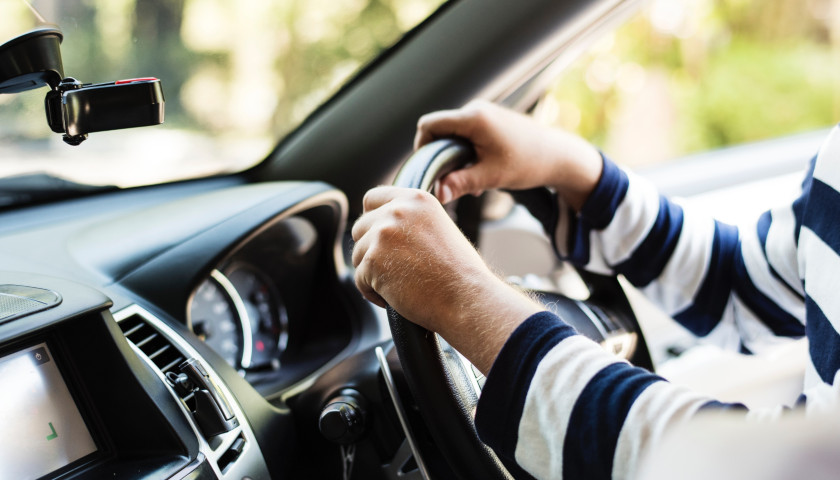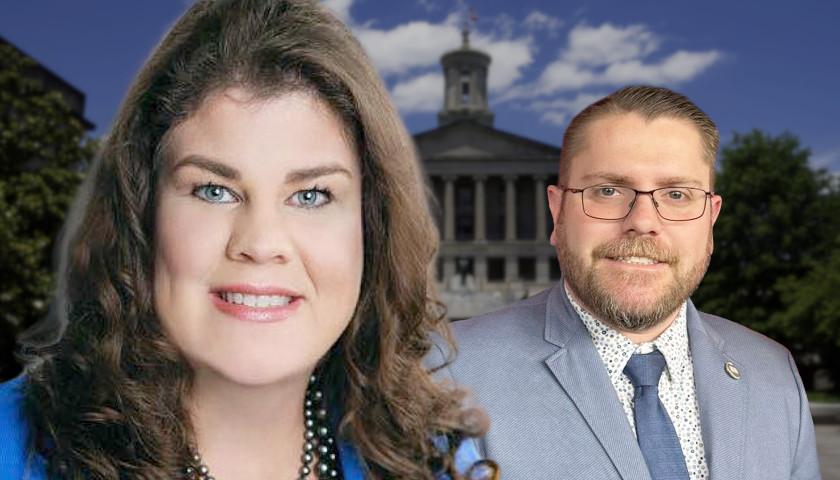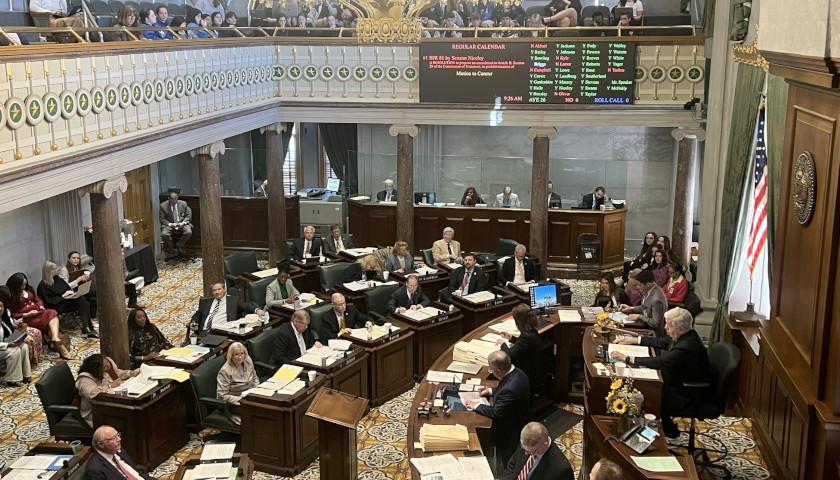Both houses of the General Assembly have passed a bill that will allow only hands-free usage of a mobile telephone or personal digital assistant on any road or highway in the state of Tennessee.
HB 0165 sponsored by Representative John Holsclaw (R-Elizabethton) and SB 0173 sponsored by Senator Swann (R-Maryville) will go into effect on July 1, 2019.
Current law prohibits a driver from talking on a hand-held mobile device while the vehicle is in motion in a school zone when the warning flashers are in operation.
A violation under current law is a non-moving traffic violation, with no points added to a driver’s record for the Class C misdemeanor punishable only by a fine of up to $50.00 plus court costs not to exceed $10.
In addition, under current law it is considered a delinquent act for anyone under the age of 18 to talk on a mobile phone while operating a motor vehicle equipped with a hands-free device on any road or highway in Tennessee.
The new law defines ‘hands-free’ and extends the requirement to be ‘hands-free’ to all roads and highways in Tennessee.
Activities prohibited with a wireless telecommunications device in the new law while operating a motor vehicle on any road or highway in the state includes:
- physically holding or supporting with any part of a person’s body
- writing, sending or reading any text-based communications including but not limited to text messages, instant messages, email or internet data
- reaching for a device in a manner that requires the driver to no longer be in a seated driving position or properly restrained by a safety belt
- watching a video or movie
- recording or broadcasting video
A driver 18 years or older can use an earpiece, headphone device or a device worn on a wrist to conduct voice-based communication and may use one button on a wireless telecommunications device to initiate or terminate a voice communication.
A driver’s hand may be used to activate or deactivate a feature with one swipe or tap of the driver’s finger, if the wireless telecommunications device is mounted on the vehicle’s windshield, dashboard or center console in a manger that does not hinder the driver’s view of the road.
The motion must not activate a camera, video, gaming features or functions for viewing, recording, amusement or other non-navigational functions, except if they are related to the transportation of persons or property for compensation or payment of a fee.
Exempted from the law are law enforcement personnel, campus police and public safety officers, emergency medical responders, emergency medical agency officers, persons communicating with emergency services agencies in a bona fide emergency, employees or contractors of public utility service providers during the course of their duties as well as persons stopped or parked in their vehicles.
The new law creates a moving traffic violation, which is subject to three points on a driver’s license for each violation in addition to the $50 fine and $10 in court costs.
A first-time offender may attend and complete a driver education course in lieu of any fine imposed.
In the case of a third or subsequent offense by a driver, or if the violation results in an accident, the fine increases to $100. If a violation occurs in a work zone with Department of Transportation or construction workers present or in a marked school zone when warning flashers are in operation, the fine increases to $200.
The bill was presented on the House floor on April 17, by its sponsor Representative Holscaw, who was joined by several of the co-sponsors, including Representatives Bob Freeman, Ron Gant, Curtis Halford, Patsy Hazelwood, Jason Powell, Johnny Shaw and Rick Tillis.
Holsclaw said that as legislators they try very hard to make Tennessee number one in everything that they do, and that they’ve done a phenomenal job of that.
“However, we’re number one in the statistics that bothers me greatly,” Holsclaw went on. “Tennessee ranks number one in death fatalities due to distracted driving, and that’s a major concern of mine. It costs many lives. Also, that’s five times higher than the national average.”
Over the next 45 minutes, about 20 lawmakers either asked questions or spoke on the proposed legislation – both for and against – although speakers about two to one were against the measure.
Holsclaw maintained that the state of Georgia implemented the law last year, which he modeled his bill after, and they have seen a 41 percent in distracted driving incidents. He added that not only was there a reduction in the accidents, which speaks to the effectiveness of the bill, but their insurance also started to lower.
Near the conclusion, though, Holsclaw relayed that he didn’t care about costs or points, he just wanted to save lives.
The House bill passed with three points to spare with 53 Ayes, 38 Nays and 4 Present and Not Voting.
Representatives voting Aye were: Charlie Baum (R-Murfreesboro), Bill Beck (D-Nashville), Rush Bricken (R-Tullahoma), Karen Camper (D-Memphis), Dale Carr (R-Sevierville), Jesse Chism (D-Memphis), John Ray Clemmons (D-Nashville), Jim Coley (R-Bartlett), Michael Curcio (R-Dickson), John DeBerry (D-Memphis), Vincent Dixie (D-Nashville), Bill Dunn (R-Knoxville), Bob Freeman (D-Nashville), Ron Gant (R-Rossville), Johnny Garrett (R-Goodlettsville), Curtis Halford (R-Dyer), Mark Hall (R-Cleveland), Kirk Haston (R-Lobelville), Patsy Hazlewood (R-Signal Mountain), Esther Helton (R-East Ridge), Gary Hicks (R-Rogersville), Jason Hodges D-Clarksville), John Holsclaw (R-Elizabethton), Dan Howell (R-Georgetown), Darren Jernigan (D-Nashville), Curtis Johnson (R-Clarksville), Gloria Johnson (D-Knoxville), Doc Kumar (R-Springfield), William Lamberth (R-Portland), Tom Leatherwood (R-Arlington), Mary Littleton (R-Dickson), Harold Love (D-Nashville), Pat Marsh (R-Shelbyville), Jerome Moon (R-Maryville), Brandon Ogles (R-Franklin), Antonio Parkinson (D-Memphis), Jason Potts (D-Nashville), Jason Powell (D-Nashville), Bob Ramsey (R-Maryville), Jerry Sexton (R-Bean Station), Johnny Shaw (D-Bolivar), Paul Sherrell (R-Sparta), Robin Smith (R-Hixson), Rick Staples (D-Knoxville), Mike Stewart (D-Nashville), Dwayne Thompson (D-Cordova), Rick Tillis (R-Lewisburg), Terri Lynn Weaver (R-Lancaster), Mark White (R-Memphis), Sam Whitson (R-Franklin), Ryan Williams (R-Cookeville), Dave Wright (R-Corryton), Mr. Speaker Glen Casada (R-Franklin)
Representatives voting No were: David Byrd (R-Waynesboro), Kent Calfee (R-Kingston), Mike Carter (R-Ooltewah), Scott Cepicky (R-Culleoka), Mark Cochran (R-Englewood), Barbara Cooper (D-Memphis), John Crawford (R-Kingsport), Clay Doggett (R-Pulaski), Rick Eldridge (R-Morristown) Jeremy Faison (R-Cosby), Andrew Farmer (R-Sevierville), Bruce Griffey (R-Paris), Yusuf Hakeem (D-Chattanooga), G. A. Hardaway (D-Memphis), David Hawk (R-Greeneville), Matthew Hill (R-Jonesborough), Timothy Hill (R-Blountville), Andy Holt (R-Dresden), Bud Hulsey (R-Kingsport), Chris Hurt (R-Halls), Kelly Keisling (R-Byrdstown), Justin Lafferty (R-Knoxville), Susan Lynn (R-Mt. Juliet), Larry Miller (D-Memphis), Bo Mitchell (D-Nashville), Jay Reedy (R-Erin), Tim Rudd (R-Murfreesboro), Iris Rudder (R-Winchester), Lowell Russell (R-Vonore), Mike Sparks (R-Smyrna), Brian Terry (R-Murfreesboro), Chris Todd (R-Madison County), Joe Towns (D-Memphis), Ron Travis (R-Dayton), Micah Van Huss (R-Jonesborough), Kevin Vaughan (R-part of Shelby County), John Mark Windle (D-Livingston), Jason Zachary (R-Knoxville)
Representatives Present and Not Voting were: London Lamar (D-Memphis), Dennis Powers (R-Jacksboro), John Ragan (R-Oak Ridge), Bill Sanderson (R-Kenton)
The Senate version of the bill wasn’t taken up until April 30, and Senators rising to speak on the bill were more equally divided in their opposition or support for the legislation.
In the end, the Senate vote resulted in 23 Ayes and 7 Nays and 1 Present and Not Voting.
Senators voting Aye were: Raumesh Akbari (D-Memphis), Janice Bowling (R-Tullahoma), Richard Briggs (R-Knoxville), Steve Dickerson (R-Nashville), Todd Gardenhire (R-Chattanooga), Brenda Gilmore (D-Nashville), Dolores Gresham (R-Somerville), Ferrell Haile (R-Gallatin), Ed Jackson (R-Jackson), Jack Johnson (R-Franklin), Brian Kelsey (R-Germantown), Sara Kyle (D-Memphis), Becky Massey (R-Knoxville), Bill Powers (R-Clarksville), Shane Reeves (R-Murfreesboro), Kerry Roberts (R-Springfield), Katrina Robinson (D-Memphis), Paul Rose (R-Tipton and Shelby County), Art Swann (R-Maryville), Bo Watson (R-Hixson), Ken Yager (R-Kingston), Jeff Yarbro (D-Nashville), Mr. Speaker Randy McNally (R-Oak Ridge)
Senators voting No were: Mike Bell (R-Riceville), Joey Hensley (R-Hohenwald), Frank Niceley (R-Strawberry Plains), Mark Pody (R-Lebanon), Steve Southerland (R-Morristown), John Stevens (R-Huntingdon), Dawn White (R-Murfeesboro)
Senators Present and Not Voting were: Rusty Crowe (R-Johnson City)
The bill also directs Tennessee Department of Transportation to utilize the overhead electronic informational displays located throughout the estate to provide periodic messages to the motoring public as to the new law.
Additionally, the state Department of Safety is directed to include distracted driving as part of the instructional information used in driver education training.
According to the National Highway Traffic Safety Administration, Tennessee joins at least 15 states plus the District of Columbia, Guam, Puerto Rico and the U.S. Virgin Islands, that had a hands-free law in place as of 2017 plus Georgia that passed the law last year.
Further information about the bill can be found here.
The full text of the amendment that “makes the bill” can be read here.
– – –
Laura Baigert is a senior reporter at The Tennessee Star.









I don’t even like the idea of having your phone turned on (well, the screen, I guess the phone is always turned on) well driving. Those phone holding attachments for dashboards just encourage people to not look at the road (a distraction???). Our phones are often our GPS systems, but we should be pulling over or having a passenger look at the phone for us when we are looking at the maps, or if we need turn-by-turn instructions, use the audio and then pull over if you want to confirm your location or decide what you want to do. If your phone causes you to need to use any hands or causes any distractions, you shouldn’t be using it while driving. Period.
[…] new ‘hands-free’ law, as previously reported by The Tennessee Star, defines what it means to be ‘hands-free’ and extends the requirement to […]
Why is law enforcement exempted they can use there radio and Bluetooth just as easily as ever other citizens.. it’s crazy there exempted and talk on there phones and text while. Citizens have to get find if it’s a law for citizens it should be law for everyone! No exemptions. I am for the law less distraction drivers. But everyone should be accountable for the hands free including law enforcement personnel!
Of course “law enforcement” is exempted. Republicans will never hold them accountable for the laws they force on the people. Murder, vehicular homicide, armed robbery…always “qualified immunity” and zero accountability. Please show the scientific research that says their brains work any differently than ours and can safely do the things you declare unsafe for the taxpayer peasants.
So I can be distracted by the almighty state’s assinine “get uour head out of your apps” text messages on the very busiest of highways but not make a phone call?
Can I look at my gas gauge, my radio display, my speedometer, electronic flashing billboards, etc.?
I wish the lawmakers would figure out how to make it a criminal offense for people to lie under oath to judges. Oh, wait! That already is a criminal offense, isn’t it? How about requiring the state to prosecute in cases of perjury when an offended party requests it? I think it would serve as a deterrent if people knew they would be arrested (probable cause) and have multiple court dates to show up for if they lied in court and the person lying against them had definite proof, like I have in my case, that they were lying.
It is ridiculous that there has been so much aggravated perjury and civil rights intimidation and severe child abuse and false reporting going on in my court case for the past 5 years and all the D.A. will do is tell me I have to hire an attorney and sue in civil court, but they have no problem making me go through a jury trial for posting a court order without reacting the name of the plaintiff making the false allegations against me who is abusively misusing the legal system to deprive me of fundamental liberties, or making me go through a jury trial to prove that I was not at a playground when nobody saw me, and my accuser stated that he only “believed” I was there, and I was actually 20 miles away. I am still waiting for my jury trial on those two charges, and the D.A. INSISTED on a jury trial when I sought a bench trial for the sake of judicial economy.
The so yakked legal system is fracked as shat